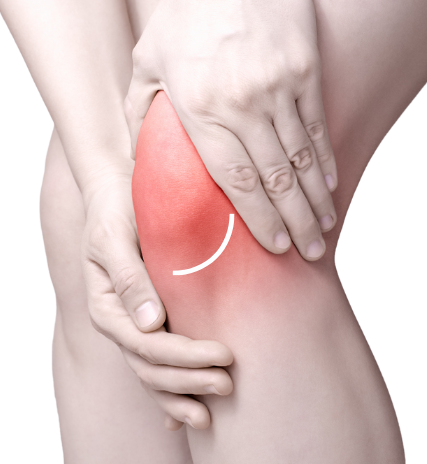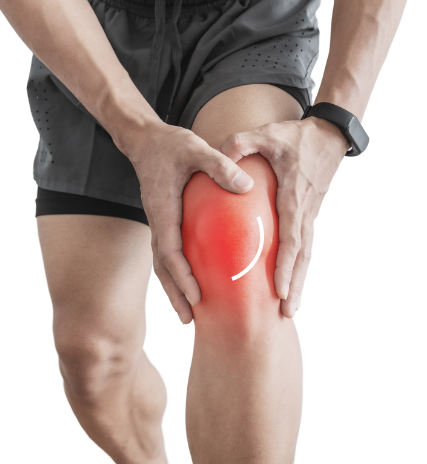Knee Meniscus Tear
About Knee Meniscus Tear
The meniscus is a hard rubber-like cartilage in the knee that absorbs shocks. They can be damaged by a sudden pivot or a hard tackle from football, these injuries can cause the meniscus to rupture.
What Causes Knee Meniscus Tear?
Knee meniscus tear are primarily caused by sports such as football, basketball and tennis, these sports cause direct trauma to the meniscus. Old age and degeneration also cause knee meniscus tears.
Risk factors for Knee Meniscus Tears include:
- Contact Sports
- Prior injury
- Improper techniques and jumping

What Causes Knee Meniscus Tear?
Knee meniscus tear are primarily caused by sports such as football, basketball and tennis, these sports cause direct trauma to the meniscus. Old age and degeneration also cause knee meniscus tears.
Risk factors for Knee Meniscus Tears include:
- Contact Sports
- Prior injury
- Improper techniques and jumping
Symptoms Of Knee Meniscus Tear
Knee Pain
Stiffness
Swelling and Tenderness
Instability or Locking
A Message About Knee Meniscus Tear
Knee pain arising from a Meniscal tear is usually sharp and debilitating. The patient may have difficulty weight bearing, standing, or walking. While meniscal tear is often associated with trauma and injuries, degenerative knee changes can result in chronic mucoid tears of the meniscus without any obvious trauma to the knee.
Once the meniscus is torn, it is often difficult to repair or grow back the meniscus. Even with surgery, the torn meniscus is often cut away to prevent further extension of the tear into its surrounding meniscus. If its supporting tibial bone presents with subchondral oedema, from the exposed torn meniscus, it will take 4 – 6 weeks of non-weight bearing rest for the affected knee.
PRP injection into the knee may increase the chance of fibrosis and scarring of the tear. It can provide good pain relief. However, the knee may not be as stable as it used to be. In severe cases of tears in a degenerated knee, open total knee replacement may be the treatment option.

Diagnosing Knee Meniscus Tear
Here at Singapore Paincare, our team of experienced primary care and specialist pain care doctors will conduct a thorough diagnosis. This includes a physical exam, questions about your symptoms and an evaluation of your medical history. An X-ray or MRI may also be needed to assess the damage.
What Treatments Are Available for Knee Meniscus Tear
With the increasing volume of knee injuries, treatment methods have become extensive and comprehensive. At Singapore Paincare, we strive to treat your pain with the least invasive option possible after accurately identifying the cause. Our approach to pain resolution focuses on the removal of pain generators via specialised injection and minimally invasive procedures. Combined with pharmacological treatments and cognitive and physical rehabilitative therapies, we help patients improve functions and prevent pain from recurring.
Non-Surgical Treatment for Knee Meniscus Tear
Physical therapy
Non-steroidal anti-inflammatory drugs (NSAIDs)
Knee brace
Platelet-rich plasma (PRP)
Myospan treatment addresses both local and referred causes. Our Coreflex injections use a mix of local anaesthetic, anti-inflammatory and muscle relaxant, to be injected into the affected knee as well as any strained surrounding meniscus and ligaments.
Surgical Treatments for Knee Meniscus Tear
If the condition does not respond well to conservative treatments surgery may be needed. Surgeries always come with associated risks, complications and downtime – they may not be suitable for everyone.
Knee replacement surgery
How Can I Prevent Knee Meniscus Tear?
Accidental injuries can be hard to prevent. However, you can reduce your risk of a torn meniscus if you:
- Using a knee brace when your knee is weak or unstable
- Wearing proper athletic shoes
- Strengthen the muscle that supports and stabilizes your knee
Get Your Pain Resolved
Send your enquiries or consult our pain experts today.


